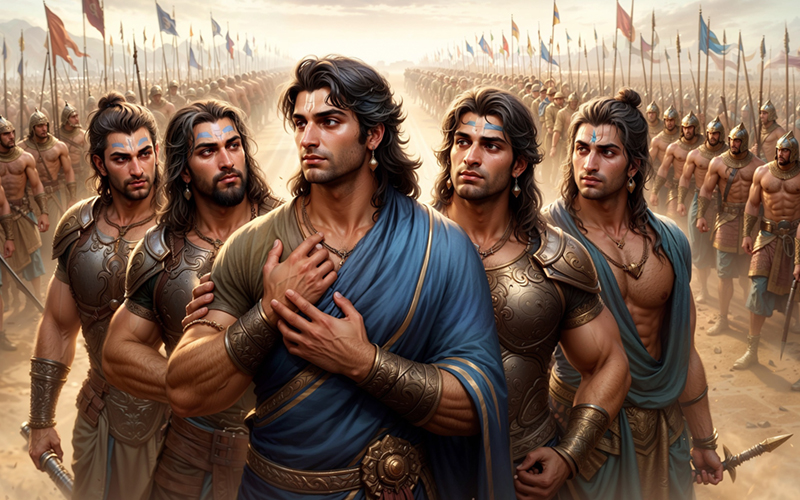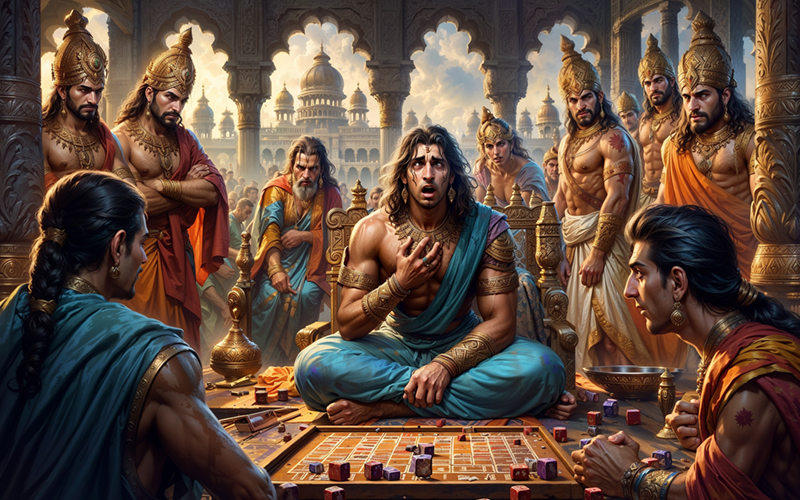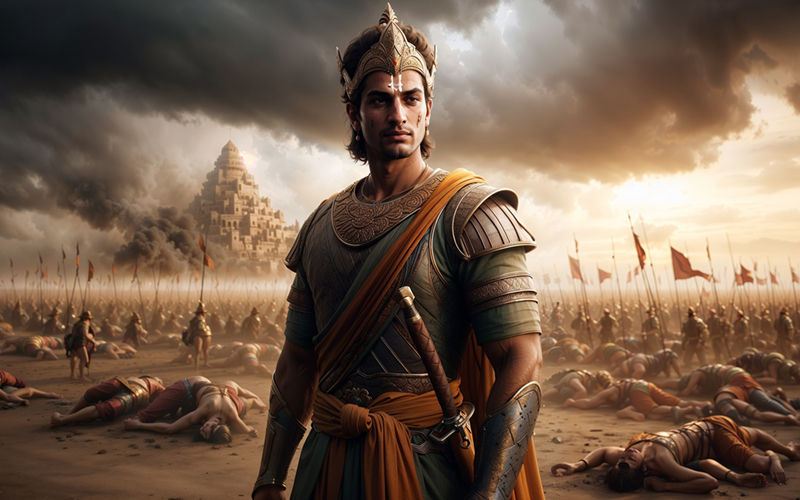Physical Address
Empirical System, 105 First Floor Pitru Krupa, Opp. R.K. Desai College, Koparli Road, Vapi (Gujarat) 396 191
Physical Address
Empirical System, 105 First Floor Pitru Krupa, Opp. R.K. Desai College, Koparli Road, Vapi (Gujarat) 396 191

In the thunderous epic of the Mahabharata, filled with celestial weapons and mighty warriors, we often measure strength by the power of one’s bow or the might of one’s mace. But what if the greatest strength isn’t found in the roar of battle, but in the silence of a burdened heart?
Today, we delve into the soul of one of the most misunderstood and profound characters of the epic: Yudhishthira, the Dharmaraj. He was not just a king; he was the human embodiment of Dharma itself. And his journey teaches us that true strength lies not in avoiding pain, but in the courage to carry it with unwavering grace.
Yudhishthira’s destiny was woven from the threads of righteousness from his very conception. Born from Kunti’s divine prayer to Lord Yama, the god of death and justice, he was literally the son of Dharma. The title “Dharmaraj” (King of Righteousness) was not a crown he wore, but the very essence of his being—an immense, lifelong responsibility to uphold cosmic truth and morality.
From his youth, his wisdom was unparalleled. Taught by legends like Drona and Kripa, he could discern right from wrong with a clarity that made him the rightful heir to the throne of Hastinapura. But as he would soon learn, the path of Dharma is rarely a straight or easy one.
Yudhishthira’s greatest trials were often not on the battlefield, but within the chambers of his own conscience. His first catastrophic test was the infamous game of dice—a masterfully orchestrated trap by his cunning uncle, Shakuni.
Bound by the Kshatriya code of honor, which dictated that a king must never refuse a challenge, Yudhishthira was forced to play. With each roll of the enchanted dice, he lost everything: his kingdom, his wealth, his brothers, and finally, his wife, Draupadi.
The scriptures paint a devastating picture of his inner state. The Sabha Parva of the Mahabharata tells us:
“Yudhishthira’s heart trembled like a leaf in the wind, for he knew that the game had brought ruin to all that he held dear.”
His failure to protect Draupadi from public humiliation would become a wound that never fully healed. This single event taught him the most painful lesson about Dharma: sometimes, following one code of righteousness can lead to a violation of another, far greater one.

Despite being a man of peace, Yudhishthira was destined to preside over the most devastating war in history. Kurukshetra was not a battle he desired; it was a war he had to fight to restore justice. The counsel Krishna gave to Arjuna in the Bhagavad Gita was for all the Pandavas, but its weight fell heaviest on Yudhishthira, the man who had to sanction the violence.
He was plagued by doubt. How could killing one’s own kin be an act of Dharma? The Mahabharata describes his frequent appeals to Krishna. In the Udyoga Parva, his anguish is palpable:
“My heart bleeds, for I know not how righteousness may survive this war of brothers.”
Krishna’s guidance was clear: sometimes, to protect Dharma from the great evil of Adharma, a painful duty must be performed. Yudhishthira had to find the strength to lead his family into a war that tore his soul apart.
While Arjuna was the bow and Bhima was the mace, Yudhishthira was the anchor. His greatest, most silent strength was his boundless love for his brothers and his ability to absorb their pain as his own.
When Arjuna’s son Abhimanyu was brutally killed, Arjuna was consumed by a fiery rage, vowing terrifying vengeance. But it was Yudhishthira, equally heartbroken, who held the family together. He had to remain composed, to be the pillar his grieving brothers could lean on, even as his own heart was shattering. The Drona Parva notes:
“Yudhishthira, despite his grief for Abhimanyu, bore the weight of his brothers’ anguish as his own, for he could not falter as their guide.”
This is the nature of silent strength: to put the needs of others before your own grief, to lead from a place of compassion even when you are broken.
Perhaps the most devastating emotional blow for Yudhishthira came after the war was already won. As he prepared to perform the last rites, his mother Kunti revealed a gut-wrenching secret: Karna, the formidable adversary whom Arjuna had killed, was his elder brother.
The weight of this truth was crushing. He had not just fought an enemy; he had been party to the death of his own blood. He had hated a man he should have revered. The guilt was unimaginable. In the Shalya Parva, his lament is a cry from a wounded soul:
“Had I known of his birth, I would have never raised a weapon against him. My heart, now burdened with his blood, will never find peace.”
This revelation redefined his entire struggle. The war was no longer just a fight for justice, but a tragic family saga where he stood on the wrong side of a brotherly bond.

When Yudhishthira finally ascended the throne as the undisputed Dharmaraj, there were no grand celebrations in his heart. The crown felt heavy, the throne cold. The victory was stained with the blood of his kin, his teachers, and millions of soldiers.
He was filled with a profound sense of guilt and sorrow. Was this throne worth the devastation? Had Dharma truly won, or had humanity simply lost? The Sauptika Parva captures his despair perfectly:
“Victory tastes like ash, for in its pursuit, I have lost my brothers, my friends, and my peace.”
Yudhishthira’s legacy is not the throne he won, but the immense emotional burden he carried with unwavering dignity. His strength was quiet. It was the resilience to uphold Dharma when it caused him personal agony. It was the compassion to lead his family through grief while his own heart was breaking. It was the integrity to accept the hollow price of victory without losing his moral compass.
Yudhishthira’s journey is a divine reminder that true spiritual strength is not measured by the battles we win, but by the burdens we carry with grace and an unshakeable commitment to our inner truth.
What does Yudhishthira’s silent strength teach you about leadership and compassion? Share your reflections in the comments below.